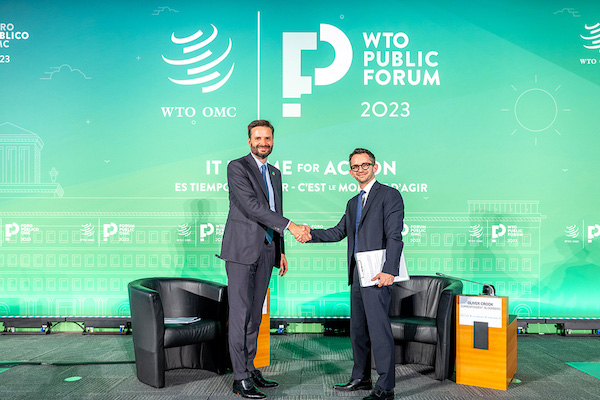World Trade Report 2023 makes case for “re-globalization” amid early signs of fragmentation

The post-1945 international economic order was built on the idea that interdependence among nations through increased trade and economic ties would foster peace and shared prosperity. For most of the past 75 years, this idea guided policymakers, and helped lay the foundation for an unprecedented era of growth, higher living standards and poverty reduction,” WTO Director-General Ngozi Okonjo-Iweala says in her foreword to the report. “Today this vision is under threat, as is the future of an open and predictable global economy.”
“The WTO is not perfect — far from it. But the case for strengthening the trading system is far stronger than the case for walking away from it,” DG Okonjo-Iweala says.
Starting with an analysis of the current state of globalization, the report confirms that geopolitical tensions are beginning to affect trade flows, including in ways that point towards fragmentation of trading relationships. WTO Secretariat calculations find, for example, that goods trade flows between two hypothetical geopolitical blocs — based on voting patterns at the UN General Assembly — have grown 4-6 per cent more slowly than trade within these blocs. However, the report contends that, despite these findings, international trade continues to thrive, implying that talk of de-globalization is on balance still not supported by the data. The publication points to the expansion of digital services trade, environmental goods trade, and global value chains in addition to the resilience of trade to recent global crises.
The report goes on to examine the relationship between economic integration and three major challenges facing today’s global economic order: security and resilience, poverty and inclusiveness, and environmental sustainability — areas in which arguments have gained ground that globalization has not delivered as expected or exposes countries to excessive risks. Looking at the evidence, the report makes the case that “re-globalization,” which is the renewed drive towards integrating more people, economies and pressing issues into world trade, is a more promising solution to these issues than fragmentation. The report shows that trade openness is strongly linked with a reduced likelihood of conflict and has led to sharp declines in poverty for over four decades. Also, technology improvements enabled by trade have had a strong impact in reducing carbon emissions.
Finally, the report emphasizes the need for more trade and more cooperation to effectively address the major issues that policymakers are facing the world over — from security to inclusiveness to climate change. A re-invigorated and reformed WTO can play a central role in tackling these challenges.
Source: World Trade Organization



